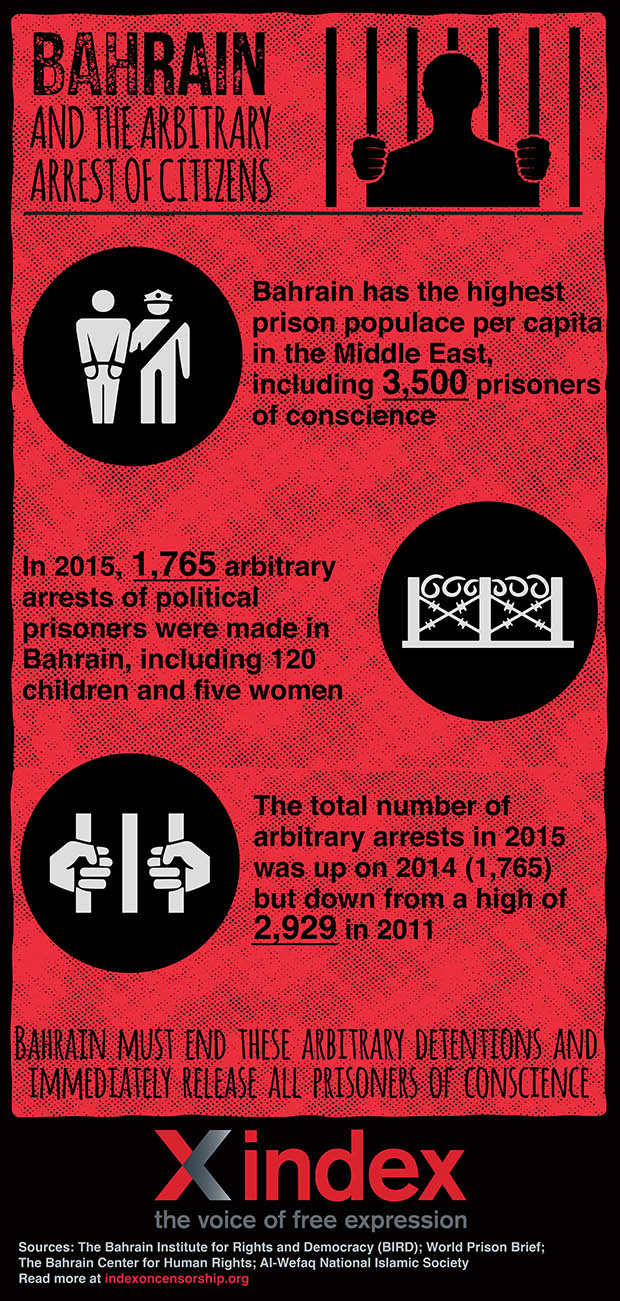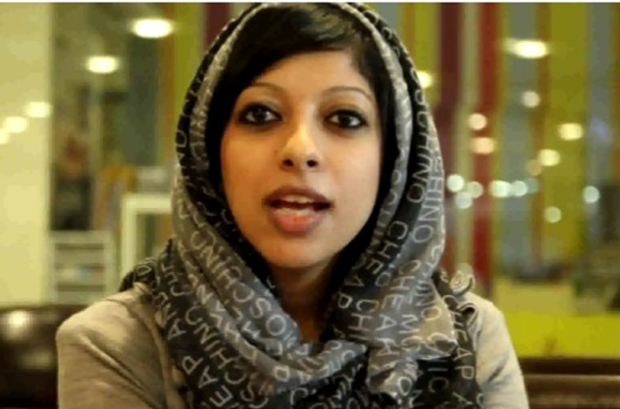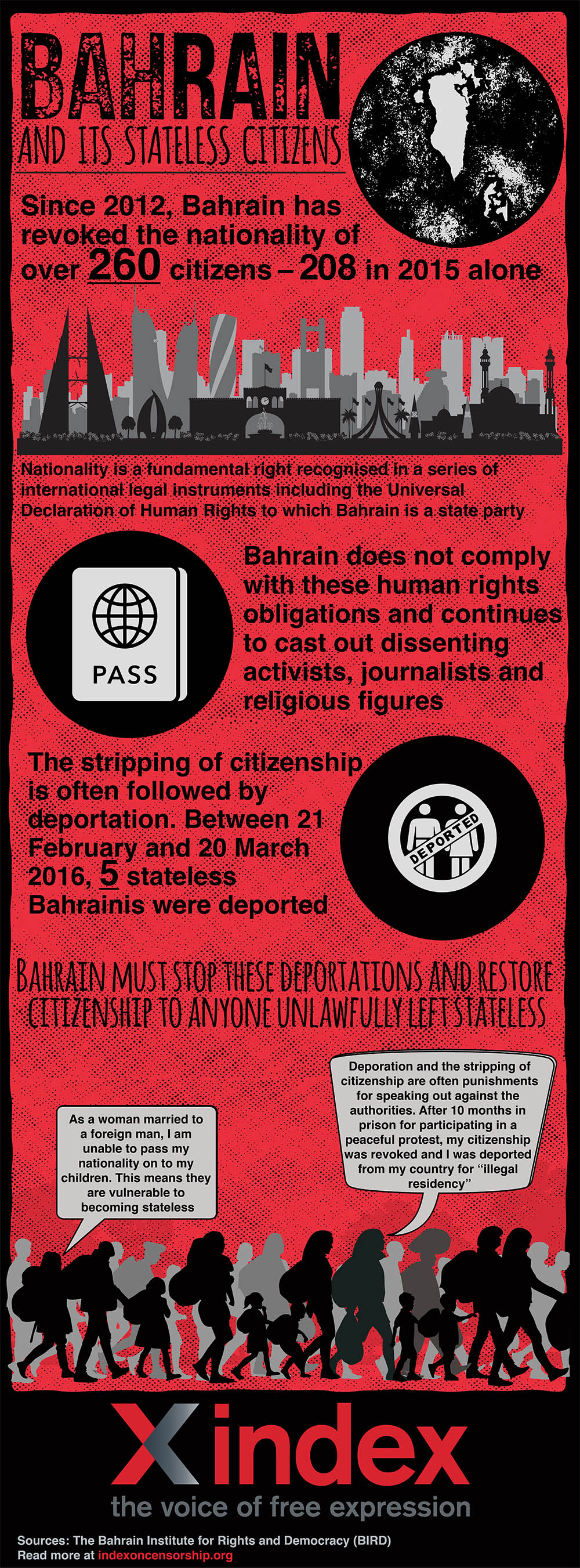13 Jun 2016 | About Index, Bahrain, Bahrain Statements, Campaigns, Campaigns -- Featured, Statements
Index on Censorship condemns the arrest on Monday 13 June of human rights campaigner Nabeel Rajab in Bahrain. According to reports Rajab was charged on Tuesday 14 June with “publishing and broadcasting false news that undermines the prestige of the state” and detained for seven days.
Rajab, a former Freedom of Expression Award winner and a judge on this year’s awards, is one of the Gulf region’s most well-known human rights activists. Since the Bahraini uprising of 2011, he has been arrested on numerous occasions: he spent two years in jail between 2012 and 2014, and was arrested just months after his 2014 release for tweets in which he called Bahraini institutions “ideological incubators” for ISIS.
Rajab, president of the award-winning Bahrain Center for Human Rights (BCHR), and a member of the advisory committee of the Human Rights Watch Middle East division, spent three months in jail for the tweets. He was rearrested on Monday, according to the Bahrain Institute for Rights and Democracy. The reasons for the arrest were unclear.
“The harassment of Nabeel Rajab must stop. We call on the international community – and especially Bahrain’s close ally, the United Kingdom – to condemn this ongoing attempt to silence one of the region’s most highly respected human rights campaigners,” said Index chief executive Jodie Ginsberg.
Bahraini authorities have repeatedly targeted Rajab as well as other human rights campaigners and political activists. Last week, Zainab Al-Khawaja was forced into exile in Denmark. Abdulhadi Al-Khawaja, her father, is serving a life sentence for his calls for democracy in Bahraini society. Her sister, Maryam Al-Khawaja, has also been harassed by the authorities and has been exiled to Denmark.
Related: Bahrain continues to use arbitrary detention as a weapon to silence critics
3 Jun 2016 | Bahrain, Middle East and North Africa, mobile, News

Bahraini authorities this week released opposition activist Zainab Al-Khawaja, who had been imprisoned with her infant son since March. She had been convicted of insulting the Bahraini king after she ripped up a picture of him.
Al-Khawaja may now be out of prison — though she could be re-arrested at any time — but her father, Abdulhadi Al-Khawaja, is one of over 3,500 prisoners of conscience who remain in Bahrain’s jails. According to research by World Prison Brief, Bahrain has the highest number of prisoners per capita in the Middle East, with 301 people in jail per 100,000 people of its 1.3 million population (followed by Israel at 256).
Arbitrary detention is the imprisonment of a person without proper evidence that they committed a crime or a case in which there has been no proper due process. Last year, the Liberties and Human Rights Department (LHRD) of Al-Wefaq National Islamic Society recorded a total of 1,765 arrests by security services for reasons related to the opposition political movement, including the arrests of 120 children and five women.
The total number of arbitrary arrests last year was up on 2014 (1,765) but down on 2013 (2,192), 2012 (2,221) and 2011 (2,929).
The UN Working Group on Arbitrary Detention, a UN body consisting of five experts, has repeatedly concluded that Bahrain has violated several international standards of a fair trial. In September of last year, the group found the detention of the secretary general of Al-Wefaq National Islamic Society, Sheikh Ali Al-Salman — this month sentenced to nine years imprisonment — to be arbitrary and “falls under category II and III of the Working Group’s categories of arbitrary detention”.
The five categories of arbitrary deprivation of liberty, according to the UN group are: when it is clearly impossible to invoke any legal basis justifying the deprivation of liberty (I); when the deprivation of liberty results from the exercise of the rights or freedoms (II); when the total or partial non-observance of the international norms (III); when asylum seekers, immigrants or refugees are subjected to prolonged administrative custody without the possibility of administrative or judicial review or remedy (VI); and when the deprivation of liberty constitutes a violation of international laws for reasons of discrimination (V).
In 2013, the UN Working Group on Arbitrary Detention found the imprisonment of Index on Censorship’s Freedom of Expression Awards 2016 judge Nabeel Rajab (since pardoned) to be arbitrary, and, along with Index, called for his release.
Last year’s arbitrary arrests of prisoners of conscience in Bahrain included Mohammed Mahdi Alekri, a member of Al-Wefaq’s advisory board who was arrested on 4 January 2015 by security forces during a demonstration against the arrest of Al-Salman.
Also among those arrested was Sayed Sa’eed Isa, a member of The Martyrs Associate and father to Sayed Hashim Saeed, the 15-year-old boy killed during the security crackdown on demonstrations in Sitra late 2011.
The Bahraini authorities have continued to use arbitrary detention to silence political opponents and opposition supporters.
6 May 2016 | Bahrain, Bahrain Statements, Campaigns, Campaigns -- Featured, Middle East and North Africa, mobile

On 7 April 2016, Bahraini foreign minister Sheikh Khaled bin Ahmed al-Khalifa told the US State Department during meetings with Secretary of State John Kerry that activist Zainab Al-Khawaja, who was imprisoned on 14 March along with her one-year-old son Abdulhadi, would be freed.
One month on, we are still waiting for her release.
Index on Censorship has repeatedly expressed concerns over the detention and treatment of Al-Khawaja. After being taken into custody, she was transferred to the Isa Town Detention Center, which has been criticised for its poor sanitation and regular outbreaks of Hepatitis C, to serve out her prison term. She was initially denied food for herself and her son.
In October 2015, Bahrain’s appeals court confirmed her conviction for insulting the king of Bahrain by tearing up a photograph of him and reduced her three-year prison sentence to one year.
“Zainab Al-Khawaja is serving prison term based on charges related to her right to freedom of expression and assembly,” said Index’s senior advocacy officer Melody Patry. “Her imprisonment violates international human rights standards and every day she spends in jail brings into question Bahrain’s commitment to democracy and the rule of law.”
“We call on Bahrain to keep the promise made to the US State Department a month ago to release Zainab Al-Khawaja with no further delay,” Patry added.
The US State Department has also reminded Bahrain to follow its promise to release Al-Khawaja and her son “as soon as possible”. The UK government has raised Al-Khawaja’s case “with the Government of Bahrain at the highest levels”, but has failed to call for her release.
The Al-Khawaja family, who have been active in Bahrain’s pro-democracy movement, and have been harassed and targeted by authorities.
Al-Khawaja’s father, Abdulhadi Al-Khawaja, head of the 2012 Index Award-winning Bahrain Center for Human Rights, is serving a life sentence for the role he played in the 2011 demonstrations in Bahrain.
Bahrain must now adhere to its promise and free Zainab Al-Khawaja.
28 Apr 2016 | Bahrain, Middle East and North Africa, mobile, News

When we read about displaced people in the press, we usually hear about Syrian refugees fleeing IS or the one person per second displaced by natural disasters. We are less likely to be made aware of those who have become stateless through forced displacement.
Nationality is something most of us take for granted, but for the 10 million people worldwide who are effectively stateless, the issue is much less trivial.
Bahrain, in particular, has intensified the use of stripping citizenship from those who dissent or speak out in protest as a form of punishment. Since 2012 – when the country’s minister of the interior made 31 political activists stateless, many of whom were living in exile – 260 citizens have fallen victim, 208 in 2015 alone. Eleven juveniles, at least two of which have received life sentences, and 30 students are known to be among them.
Nationality is a fundamental right recognised in a series of international legal instruments, including the Universal Declaration of Human Rights and the International Covenant on Civil and Political Rights to which Bahrain is a signatory. The country repeatedly fails to comply with these obligations.
In 2014, new amendments to the country’s 1963 citizenship law further increased the power of the ministry of the interior and gave judges the authority to make anyone convicted under Bahrain’s anti-terrorism act, which fails to properly define terrorism, stateless.
In the case of Sayed Alwadaei, director of advocacy at the Bahraini Institute for Rights and Democracy (BIRD) and 71 others who were deprived of citizenship in January 2015, their “crimes” included vague terms such as “inciting and advocating regime change” to “defaming brotherly countries”.
Speaking to Index on Censorship, Alwadaei said: “Bahrain is setting up a dangerous precedent. No state has rendered as many of its citizens stateless in 2015. These revocations are politically motivated, and are becoming more common because they got away with it in 2012.”
“I was targeted because of my activism, and Bahrain considers human rights advocates as terrorists,” he added. “As I was not inside the country to face imprisonment, my nationality was the only way they could inflict pain on me. It was used as a tool to cause the maximum damage to stop my human rights work.”
While Alwadaei has not let the authorities take his identity, it does mean he is now stateless. “For my family, it means my infant son can’t have Bahraini citizenship, although his mother is also Bahraini.”
The danger for those made stateless inside Bahrain’s borders is that they do not have access to jobs, schools or health care and their bank accounts are closed, Alwadaei explains. “The people revoked of citizenship are at high risk of deportation by the court; many already have been under charges of ‘illegal residency’.”
These instances are also increasing. Between 21 February and 20 March 2016, five stateless Bahrainis were deported. One of these was Hussain Khairallah, whose citizenship had been revoked since 2012. He had been a union organiser and one of the medics who treated wounded protesters during the Bahrain’s Bloody Thursday in February 2011 when security forces launched a pre-dawn raid to clear a protest camp at Pearl Roundabout in Manama.
Anyone speaking out against the authorities faces such risks.
These practices and threats should immediately cease and all those who have fallen victim should have their citizenship restored. It is their right.



